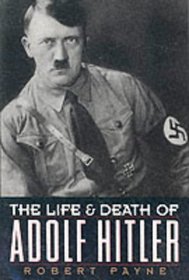Search -
Life and Death of Adolf Hitler
Life and Death of Adolf Hitler
Author:
Rumor has it that our young are now so far removed historically from the experience of Hitler that so many of us felt so immediately that they sometimes confuse him as a contemporary of, say, Napoleon. Moreover, they haven't learned nor absorbed the full horror of the reign of carnage he visited upon the western world. Payne wants us all to ... more »
Author:
Rumor has it that our young are now so far removed historically from the experience of Hitler that so many of us felt so immediately that they sometimes confuse him as a contemporary of, say, Napoleon. Moreover, they haven't learned nor absorbed the full horror of the reign of carnage he visited upon the western world. Payne wants us all to ... more »
ISBN-13: 9781566198400
ISBN-10: 1566198402
Publication Date: 3/1995
Pages: 623
Rating: 1
ISBN-10: 1566198402
Publication Date: 3/1995
Pages: 623
Rating: 1
3.5 stars, based on 1 rating
Publisher: Dorset Press
Book Type: Paperback
Other Versions: Hardcover
Members Wishing: 0
Reviews: Amazon | Write a Review
Book Type: Paperback
Other Versions: Hardcover
Members Wishing: 0
Reviews: Amazon | Write a Review
Genres:
- Biographies & Memoirs >> General
- Biographies & Memoirs >> Historical >> Holocaust
- Biographies & Memoirs >> Leaders & Notable People >> Political
- Biographies & Memoirs >> Leaders & Notable People >> Military >> General
- Biographies & Memoirs >> Professionals & Academics >> Military & Spies
- Biographies & Memoirs >> People, A-Z >> ( H ) >> Hitler, Adolf
- History >> Europe >> General
- History >> Europe >> Germany >> General




